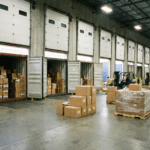The recent tariff case before the Supreme Court of the United States (SCOTUS) could significantly reshape global logistics—especially for a full-service provider like Global CFS, which offers container freight stations (CFS), trucking, and line-haul services between key air cargo gateways, as well as airport recovery operations at Chicago O’Hare. Plugged into 24/7/365 operations, we manage import, export, and e-commerce flows with real-time transparency. A Supreme Court decision in this case will demand strategic readiness across warehousing, screening, drayage, and trucking lanes.
What the Case is About
- The core argument centres on whether the President has authority under laws like the International Emergency Economic Powers Act (IEEPA) to impose sweeping tariffs without new legislation.
- From an industry viewpoint, the issue is that unpredictable tariffs result in higher risk, higher costs, and more complicated planning.
- From the government’s viewpoint, the issue is that international trade protection can require rapid action and broad executive tools.
What’s at Stake for Logistics
- If the Court rules against broad executive tariff authority, tariffs could be rolled back or altered, leading to refund claims, rapid restructuring of trade flows, and pricing volatility.
- If the Court rules in favor of such authority, future tariff actions could occur more quickly, reducing predictability for shippers and logistics providers alike.
- For Global CFS’s services, this touches:
- Bonded CFS operations (import/export)
- Trucking and line-haul between air-cargo gateways and drayage lanes
- E-commerce parcel handling (Type 86 entries)
- Cargo screening and customs exam operations
- Bonded CFS operations (import/export)
What to Expect and Timeline
- The Court heard arguments and has accelerated review of the matter, signalling urgency.
- A decision could be made by late 2025 (December) or early 2026, depending on whether additional time is required.
- After the decision:
- If the ruling goes one way, there could be direct appeals or a motion for reconsideration within the Supreme Court or further litigation in lower federal courts, depending on the scope.
- If tariffs are invalidated, Treasury/Customs agencies may need to issue guidance/refunds, which takes months of regulatory follow-through.
- Logistics providers should anticipate operational shifts, such as contract renegotiations, rate resets, and supply chain rerouting.
- If the ruling goes one way, there could be direct appeals or a motion for reconsideration within the Supreme Court or further litigation in lower federal courts, depending on the scope.
What It Could Mean for Global CFS Clients
“In a world where trade rules shift overnight, logistics partners must be both agile and resilient,” says Steve Panzarella, President of Global CFS. “This tariff case could either restore stability or introduce new layers of uncertainty. Our role is to keep those freight wheels turning regardless.”
- Clients should review contracts and carriers for exposure to tariff changes.
- Real-time visibility (such as our proprietary warehouse management and line-haul tracking) becomes even more critical.
- Buffer capacity, alternate routing, and cost scenarios should be modelled now—not later.
If your supply chain crosses international boundaries or relies on bonded CFS, air gateway trucking, or complex import/export flows, now is the time to partner with a logistics provider who monitors trade policy for you. Contact Global CFS today to assess your exposure to the tariff case outcome and build a strategy to keep your freight moving with clarity and confidence.


